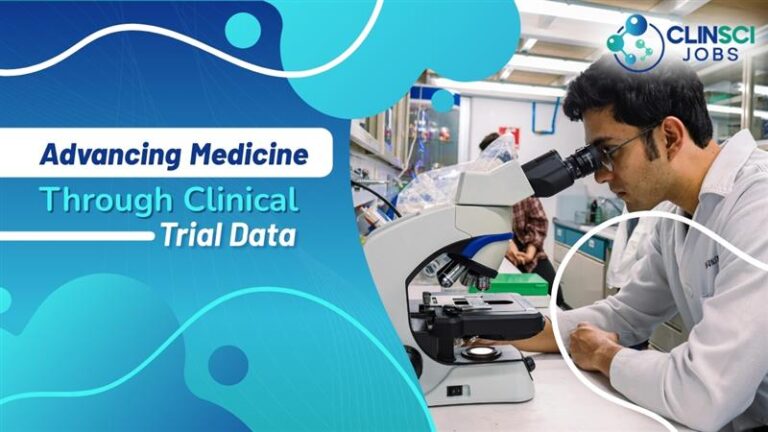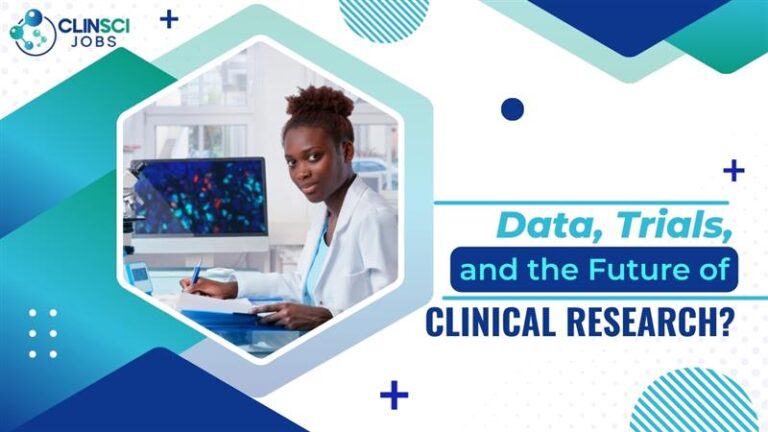Table of contents ▸
The clinical research areas in the United States have been transformed over the last few years. At the forefront of this revolution is artificial intelligence (AI) a technology that is transforming how healthcare and clinical research is approached. Whether utilized to streamline the recruitment of patients or analyze complex datasets, AI stands at the forefront of a new wave of innovation in the clinical trial sphere. Let’s delve into the world of how AI is revolutionizing clinical research all across America.
The Advent of AI in Research into Healthcare

Clinical research is no longer merely a development that is considered important but has emerged as the very change required when conducting studies and carrying out clinical trials. Over the past decade, healthcare professionals, doctors, and researchers have been faced with copious amounts of data; in an unprecedented manner, AI has been their lifeline, helping them sort and analyze information.
Speeding up Drug Discovery
One exciting application of AI in clinical research is in drug discovery. What might have taken years with billions of dollars is now surprisingly altered by AI.
AI is shifting the equation as follows: Machine learning algorithms can sort through the huge libraries of compounds, predicting which ones are most likely to be effective against specific diseases.
- These systems learn with each iteration, increasing their precision and effectiveness.
- The scientists then identify the promising candidates and look at them much more thoroughly, saving years in the development process of a drug.
Enhancing Patient Recruitment and Retention
Identifying the right patient population for clinical studies is always a challenge. AI makes this very important step much easier:
- Selection of potential candidates who meet the inclusion criteria for recruitment into a research study shall be done by AI from an electronic health record.
- Predictive models shall help investigators predict which patients are less likely to drop out early from a study, thus improving retention rates.
- AI-powered chatbots can respond to participants’ questions around the clock, break barriers in recruitment, and make it less cumbersome for a respondent to connect with a study.
- It doesn’t stop at early research. It’s changing the way the clinical trials are conducted, monitored, and analyzed.
Live Analytics in Clinical Trials
In clinical trial environments where things move fast, timely insights are everything, and –
- AI’s algorithms can process multiple sources of data, alerting researchers to potential safety issues or unexpected results.
- This rapid analysis enables more responsive designs of the trial, where the protocol can be adapted in response to emerging data.
- Outcome: safer, more efficient trials that could bring the life-saving treatment faster for the patients.
Decreased Bias and Increased Accuracy
Human error and bias are always lingering shadows in research. AI offers techniques that help mitigate these effects –
- Uses machine learning models to identify patterns or anomalies in data sets that even with human research, mightn’t be noticed.
- It makes blind studies possible better, and there is less likelihood of bias in results.
- Data collection and analysis procedures can be standardized due to AI, which also supports the reproducibility of outcomes.
Introduction to AI as a Research Partner, not a Replacement
There are benefits of AI in clinical research, but it must always be remembered that AI is a tool. The application of such research should complement humans, not replace human expertise in –
- The ability to process vast amounts of data or identify patterns will never be rivaled, but interpreting these results often requires human insight.
- The ethical considerations during the design and implementation of research will ever remain firmly within human decision-making.
Perhaps one of the most successful approaches spans the computational prowess of AI with the subtle appreciation of seasoned investigators.
Connecting Gaps: Education for Future Generation
As AI becomes an increasingly integral part of research in a clinical setting, there is a growing need for professionals who can bridge technology and healthcare –
- Universities all over the USA have begun working to develop programs that intertwine data science with biomedical research.
- Training of existing researchers is continuously engaged towards the usage of AI tools to maximum advantage in research.
- The new generation of “AI-literate” clinical researchers will be at the forefront of generating technological innovation in the field.
Future Prospects: AI and Clinical Research in the United States

There is widespread use of AI in clinical research in the USA which remains at its infancy, but the potential is enormous:
Increased personalized treatment, where AI serves to tailor interventions to the individual patient. “The digital twin” of patients is going to revolutionize how treatments are tested before transfer into humans. More advanced AI than ever will predict potential side effects and drug interactions. But great power means great responsibility. And as AI adoption increases in clinical research settings, some of the critical issues arising in those contexts also need to be addressed by us:
- How can the privacy and security of patient data when used for AI-enabled research be protected?
- What regulatory structures do we need to establish for AI-enabled clinical trials?
- How can we address the risk of bias in AI algorithms so that results derived from AI-enabled research are equitable?
The undeniable truth is that artificial intelligence is changing clinical research within the United States. From speeding up discovery to improving the conduct of clinical trials, AI proves to be an invaluable asset in seeking medical breakthroughs. With it, we look forward to an era of faster, more efficient, and even more effective clinical research where humans can pull their weight with AI capabilities at their fullest symphony.
But as we hurtle toward embracing these technologies, we also have to remember that ethics should not be forgotten and that human insight does not have a substitute in healthcare. The future of clinical research in the United States has little to do with smarter machines but rather with creating a smarter, more collaborative ecosystem where AI and human researchers work hand in hand to better lives.
Follow us on social media and visit our website https://clinscijobs.com/ to learn more about AI in clinical research, job opportunities in this exciting new field, and more insight into the future of healthcare innovation.
Follow us on Social Media: LinkedIn | Facebook | Twitter | Instagram












